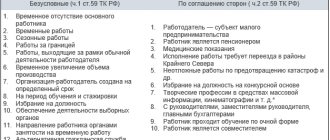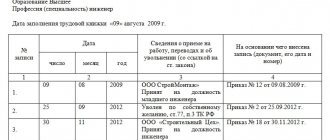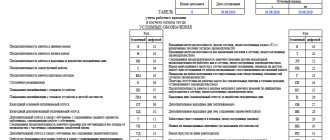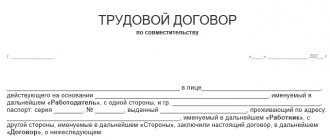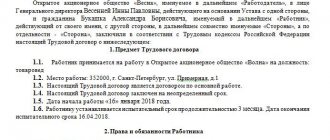Employment contract
Kurgan
May 4, 2023
We: PJSC "Kurgan Machine-Building Plant", hereinafter referred to as the Employer, represented by General Director Vladimir Afanasyevich Ustinov, acting on the basis of the Charter on the one hand, and Vitaly Mikhailovich Kopylov, hereinafter referred to as the Employee, on the other hand, have entered into this agreement as follows:
An open-ended employment contract is considered concluded if the Counterparties reach an agreement on the following essential conditions:
Conditions of education
Despite the fact that a completed sample employment contract with an employee with a training provision is rarely found, some companies still provide training, and even at their own expense.
It is acceptable that an employee who has completed training must undertake to work a certain amount of time if the employer has paid for it. If such a condition is not stipulated in the contract, then the employer risks that in the future the employee will leave for competitors without working and without paying for training.
Another important point is that such a condition can be specified in the contract only on the condition that the employee undergoes training before taking up the position. If the training is just planned, then you will have to enter into an additional agreement with the employee, which specifies the conditions for completing the training, that is, in fact, re-negotiate all the nuances regarding advanced training at the expense of the employer.
Item
Information about the subject includes provisions such as:
- position held by the employee;
- specifics of the work, i.e. type of activity of the employee;
- address of the institution where the employee is employed.
Data about the subject appears in the clauses of this agreement as follows:
1. Under this Employment Agreement, the Employer provides the Employee with work. Position - Design engineer for serial products. In accordance with this Agreement, the Employee undertakes to fulfill his job duties within the framework of the terms of this Agreement. The place of performance of the Employee’s labor duties is workshop No. 4 of PJSC Kurgan Machine-Building Plant, which is located at the address: Kurgan region, Kurgan, Mashinostroiteley Avenue 107A. The Employee’s labor activity under this Agreement is carried out under normal conditions and is his main job.
The procedure for terminating an employment contract with an employee
The Labor Code of the Russian Federation provides for the possibility of terminating an employment agreement at the initiative of any party.
The general procedure for terminating an employment relationship is as follows:
- Regardless of the circumstances and the initiator of the severance of the relationship, the termination of a trade union is accompanied by the issuance of an order on the expulsion of the working person, with whom he must be familiarized with signature.
- If the expelled specialist refuses to sign the order, this will be shown in the presence of at least two witnesses.
- Then the employer is obliged to make a corresponding entry in the work book and issue it, along with the final payment, to the dismissed person on the final date of his work.
The following types of severance of employment relations are distinguished:
- Termination of TD at the initiative of the employee.
- Termination of TD by agreement of the parties.
- Completion of urgent TD.
- Severance of labor relations at the initiative of the administration.
Termination of TD at the initiative of the employee
In other words, this is leaving work at will, when the employee submits an application and works for a 2-week period before actual dismissal (if the manager leaves work, the work is one month).
At the same time, an employee can leave the company without working on the following grounds:
- Violation of TD by the management of the company.
- Moving to another region.
- Upon retirement.
- Upon enrollment in an educational institution.
- Due to deteriorating health
During the service period, the employee has the right to change his mind and withdraw his resignation letter.
Termination of TD by agreement of the parties
In this option, an agreement to terminate the labor contract is drawn up and, if there are no claims from the parties, the application is signed by a personnel employee and the further procedure is carried out in accordance with the general procedure for terminating employment relationships.
Completion of urgent TD
The management of the institution must notify employees of the termination of a fixed-term employment agreement 3 days before the expiration of the TD. However, the boss can fire a pregnant employee only after completing her maternity leave.
Severance of labor relations at the initiative of the administration
The company's management has the right to break off relations with an employee, both on general and additional grounds.
General reasons include:
- Liquidation of the institution.
- Reduction in numbers.
- Inconsistency of the employed person with the vacancy.
- Failure of an employee to fulfill labor obligations.
- Waste of company property.
- Forgery of documents, etc.
All of the above facts must be documented. At the same time, the manager does not have the right to terminate the TD when the employee is on vacation or sick leave.
Additional grounds include the conditions for severing labor relations, enshrined in intradepartmental regulatory documents.
Note. It is impossible to terminate a TD at the initiative of the company’s management if the employee is pregnant, is a mother supporting an infant under 3 years of age, is a single mother supporting a child under 14 years of age, or a disabled child under 18 years of age.
In addition to the listed grounds for termination of a trade union, the relationship can be terminated by transfer if there is an application from the employee and confirmation from another company, when there is a change in management, etc.
The basis for deduction may also be circumstances beyond the control of the parties.
This may include:
- Call for military service
- Recognition of a worker as disabled
- When reinstating a former employee
- Death or unknown absence of an employee, etc.
In such cases, supporting documents are required as a basis for deduction.
Also, a TD can be terminated if it is declared invalid, that is, it was concluded in violation of the Labor Code of the Russian Federation.
In any case of severance of relations, the expulsion procedure is carried out in accordance with the general procedure for terminating a TD, starting with the order of expulsion.
Contract term
In our case, the period is indefinite, therefore, in the clauses of the contract it is stated “for an indefinite period.” This paragraph also indicates the date from which the citizen begins his work duties:
This employment contract is concluded for an indefinite period and comes into force from the moment of its signing. The Employee’s start date for performing his work duties is May 4, 2023. The probationary period is 14 (Fourteen) calendar days.
What form does the employment contract take?
An employment contract is concluded in the form of a written document (Article 67 of the Labor Code of the Russian Federation) and is endorsed by both parties participating in the agreement. It is compiled in 2 identical copies intended for each party. On behalf of the employer, it is signed by the employer himself or his authorized representative. The employee signs on the employer's copy upon receipt of his copy of the contract.
If, after signing the employment agreement, some necessary conditions are not reflected in it, this will require changing it by drawing up a bilateral written amendment, which will become an integral part of the agreement.
With an employee who was actually allowed to work before concluding an employment agreement, it is formalized no later than 3 days from the date of the establishment of the employment relationship, if the admission was carried out by a person who has such a right, and the employer has no objections to the conclusion of the agreement (Article 67, 67.1 of the Labor Code RF).
Rights and obligations of the parties
This section of this agreement specifies information about the obligations of the Employee and the Employer under this agreement. Often the following formulations are given:
The employee undertakes: - to perform work in accordance with the instructions of his immediate supervisor. The work must be completed efficiently and within the specified time frame. — observe labor discipline in accordance with the Charter of the enterprise; — conscientious attitude to the performance of their labor duties within the framework of this agreement; — treat with care the property entrusted by the enterprise for the performance of labor duties; — comply with safety precautions, sanitary and hygienic prevention, labor protection requirements. The Employer undertakes: - to provide work for the Employee under this agreement; — make payments in accordance with this Agreement; — ensure normal (safe) working conditions for the Employee, provided for by labor legislation; — maintain the Employee’s work book, entering information into it; The employee has the right: - to demand the fulfillment of obligations by the employer under the employment contract and labor legislation. The Employer has the right: - to demand high-quality performance of obligations by the Employee under this agreement; — reward and encourage the employee in case of high-quality, conscientious fulfillment of obligations; - bring to material and disciplinary liability.
Is using a standard form an obligation or a right?
The opportunity to consider the issue of refusing to develop local regulations is provided only to micro-enterprises. But this possibility does not give rise to the employer’s obligation to refuse to use such documents. This means that a micro-enterprise, at its own discretion, has the right to choose to continue to use local regulations or abandon them.
If the use of internal regulations continues, the form of the employment contract used at the microenterprise can be any:
- arbitrary, applied in compliance with the general rules for this document established by Art. 57 and 67 of the Labor Code of the Russian Federation. It is also acceptable to not comply with a uniform form for all existing employees.
- typical, approved Resolution No. 858.
If a micro-enterprise refuses to apply internal regulations, then the only form of employment contract that it has the right to apply becomes a standard one. In this case, the use of the right to choose to refuse to develop local regulations (all or part of them) leads to the employer's obligation to use only one form of employment agreement - a standard one.
Employers who are not micro-enterprises can also use the standard form, since they have the right to independently choose the form of employment contract that suits them. However, the choice of a standard form for them will not lead to the possibility of abandoning the development of local regulations.
If you have any unresolved questions, you can find answers to them in ConsultantPlus.
Full and free access to the system for 2 days.
Working days schedule
This paragraph indicates the specific schedule according to which the employee carries out his work activities, as well as the vacation schedule. In the text of the document, such a section is composed as follows:
The employee undertakes to perform work in accordance with the working time schedule. By virtue of this agreement, the working week includes 40 (Forty) hours of working time. The employee has the right to rest, and the Employer undertakes to provide this time. The employee has the right to paid leave, and the Employer undertakes to provide it in accordance with labor legislation.
General provisions
Before concluding an employment contract, the employer must familiarize the future employee with the company’s local regulations, job description, work schedule, and wage conditions. Next, an agreement is signed, a hiring order is issued and a corresponding entry is made in his work book (provided that the employee has not refused to continue maintaining a paper work book). After signing the contract, the parties acquire mutual rights and obligations, which they must strictly observe: the citizen undertakes to work and comply with the work schedule in force at the enterprise, and the employer undertakes to provide him with work and pay wages on time.
The agreement signed by the parties is a fundamental legal fact that determines the emergence, change and termination of the official relationship between the employer and his employee. It establishes the legal relationship between the worker and the employer and is a set of legal rules governing the official relations between the signatories of the document.
Salary
The section on wages records the amount of the employee’s salary:
The employer undertakes to pay monetary remuneration for the employee’s fulfillment of his obligations under this agreement in accordance with labor legislation and other regulations. The amount of monetary remuneration (salary) according to this agreement is 56,000 (Fifty-six) thousand rubles 00 kopecks. Payment of wages is carried out in non-cash form by transferring the amount of money to the Employee’s bank card.
Hiring under an employment contract
Hiring of a full-time employee occurs in the following order:
1. Reception and registration of a job application drawn up in any form. Such an application is required only when applying for state and municipal employees; for all other employees it may not be submitted.
2. A referral for a medical examination is also not mandatory in all cases. A document confirming the completion of a medical examination is required only for persons under 18 years of age and certain categories of workers: in the food industry, catering, trade, health workers, those involved in working with children, workers employed in hazardous and hazardous working conditions and some others.
3. Before concluding an employment contract, the employer must familiarize the employee, against signature, with local (internal) regulations that are relevant to his work activity. These documents include:
- internal labor regulations
- regulations on wages and bonuses
- regulation on the procedure for processing employee personal data and guarantees of their protection
- regulations on the structural unit
- staffing table
- job descriptions
- collective agreement, if one has been drawn up.
The question of whether the employee was familiar with the contents of local documents before signing the employment contract sometimes even becomes the cause of litigation. In order to avoid being accused of violating labor laws, some personnel workers develop logs of familiarization with internal documents, where they indicate not only the date, but also the exact time when exactly the employee became familiar with them.
This is not necessary, you can simply write a similar phrase in the text of the employment contract in the section on the employee’s responsibilities: “...comply with labor regulations, labor protection and safety requirements and other local regulations directly related to work activities, with which the employee was familiarized with signature "
4. The employee must present the documents specified in Article 65 of the Labor Code of the Russian Federation:
- passport or other identity document;
- work book and insurance certificate of state pension insurance, except in cases where the employment contract is concluded for the first time or if the employee will be a part-time worker;
- document on education, qualifications or special knowledge (if the job requires such knowledge or special training);
- military registration documents - for those liable for military service or conscripts;
- certificate of no criminal record (for teachers and some other categories).
The employer cannot require other documents, unless this is provided for by special regulations.
5. The employer and employee sign an employment contract drawn up in two copies - one for each party. In the copy of the contract, which is kept by the employer, it is necessary to provide space for one more signature of the employee “Received a copy of the employment contract.” The signed agreement is registered in a book or journal for registering employment contracts, which is developed in any form.
6. Based on the signed employment contract, an order for employment is issued in form No. T-1. A sample of such an order is available. The order is registered in the order registration book and presented to the employee within three days from the date of actual start of work. The content of the employment order or instructions on job responsibilities should not diverge from the terms of the individual employment contract.
7. The final step in hiring an employee will be making an entry in the work book and issuing a personal employee card in form No. T-2. Keeping an employee’s personal file is mandatory only for state and municipal employees; in other cases, such a file does not need to be opened.
If the employer maintains the personal files of employees, then the employee must have a folder with an internal list of documents. Such personal files include an autobiography, a questionnaire, a resume, a job application, recommendations and characteristics, medical certificates, copies of documents presented when applying for a job, an employment contract, an extract from the employment order, a personal card and other documents, related to work activity.
Responsibility of the parties
This clause stipulates the liability of the parties towards each other for causing a certain type of damage:
If damage is caused to the organization that provided the work, the Employee undertakes to compensate for this damage in accordance with Labor legislation and other regulations. If damage is caused to the Employee by the organization that provided the workplace, the Employer undertakes to compensate for this damage in accordance with Labor legislation and other regulations. Termination of the agreement does not change the fact that one of the parties is released from liability in the event of damage.
Let's sum it up
- The rules of labor legislation applied to a specific employee are established by a system of documents: the Labor Code of the Russian Federation, local regulations and an employment contract. The development of local regulations is mandatory for the employer (legal entity or individual entrepreneur). But micro-enterprises are given the opportunity to refuse to use such acts.
- According to general rules, an employment contract should not have any specific form. The employer develops such a form independently, observing the requirements to include in it the parameters called mandatory in the Labor Code of the Russian Federation, and to draw up the contract in writing. However, when we are talking about a micro-enterprise that refuses (in whole or in part) from the development of internal regulations, it becomes obligatory for it to use a standard form of an employment agreement approved by law.
- The circle of people who can use the standard form is not limited to micro-enterprises that have decided not to develop local regulations. Micro-enterprises that have not renounced the use of internal regulations, as well as all other employers, also have the right to apply it. But the transition to the use of a standard form for persons who are not obliged to use it does not entail the possibility of abandoning the development of local regulations.
